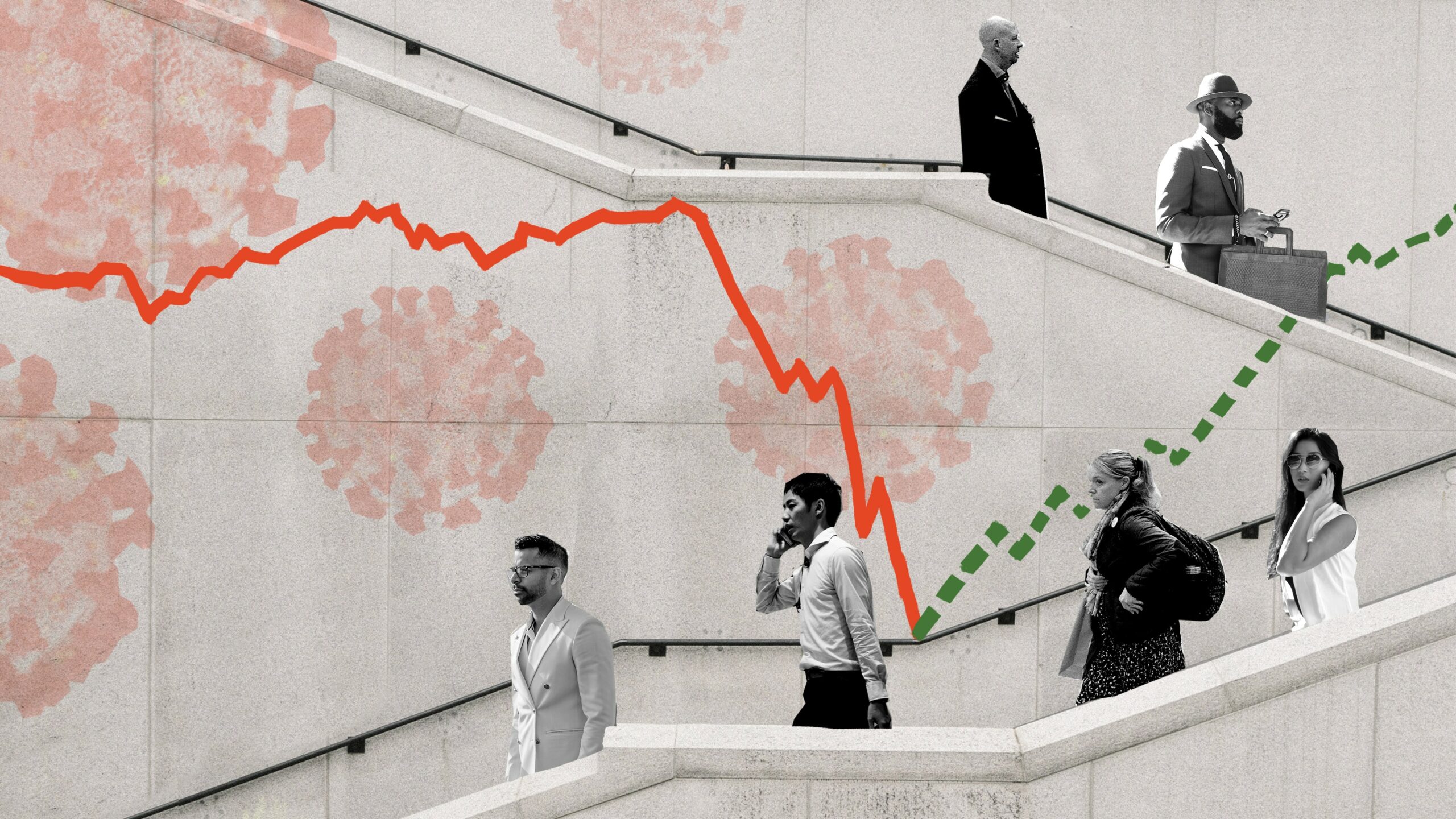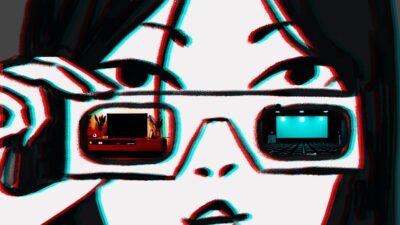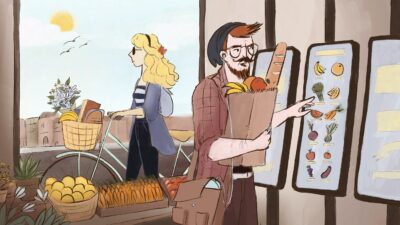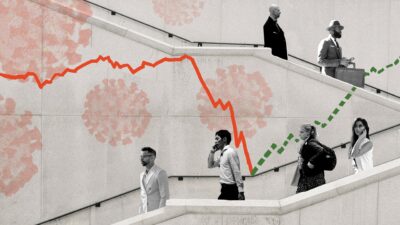Sandra Peter and Kai Riemer

Influencers on Corona Business Insights
Influencers in a pandemic: from struggling after travel lockdowns and marketing cuts to thriving in a world of online experiences.
As COVID-19 sets out to change the world forever, join Sandra Peter and Kai Riemer as they think about what’s to come in the future of business.
Shownotes
Our previous discussion on travel influencer marketing
Our previous discussion with Andrew Baxter on smart brands and marketing
Our previous discussion on selling products via live-streaming
How the coronavirus is changing the influencer business
How COVID-19 has changed the business for travel influencers
COVID-19 changes which influencers get work
CSL will engage social media influencers to encourage plasma donors
Why the COVID-19 crisis has elevated influencer marketing
Xiaohongshu is the world’s largest lifestyle platform
This episode is part of a podcast series covering what COVID-19 will mean for the business world, where we look at the impact on the economy, businesses, industries, workers and society. This is part of our ongoing coverage of the impact of COVID-19 on the future of business.
Follow the show on Apple Podcasts, Spotify, Overcast, Google Podcasts, Pocket Casts or wherever you get your podcasts. You can follow Sydney Business Insights on Flipboard, LinkedIn, Twitter and WeChat to keep updated with our latest insights.
Send us your news ideas to sbi@sydney.edu.au.
Dr Sandra Peter is the Director of Sydney Executive Plus and Associate Professor at the University of Sydney Business School. Her research and practice focuses on engaging with the future in productive ways, and the impact of emerging technologies on business and society.
Kai Riemer is Professor of Information Technology and Organisation, and Director of Sydney Executive Plus at the University of Sydney Business School. Kai's research interest is in Disruptive Technologies, Enterprise Social Media, Virtual Work, Collaborative Technologies and the Philosophy of Technology.
Share
We believe in open and honest access to knowledge. We use a Creative Commons Attribution NoDerivatives licence for our articles and podcasts, so you can republish them for free, online or in print.
Transcript
Intro From the University of Sydney Business School, this is Sydney Business Insights.
Sandra And this is Corona Business Insights. I'm Sandra Peter.
Kai And I'm Kai Riemer.
Sandra And we're back unpacking the impact of COVID-19 on business, the economy, industry, government, workers and society and looking at the effects of the pandemic.
Kai And this podcast is part of a larger initiative by the University of Sydney Business School.
Sandra You can find our COVID business impact dashboard online@webhost.sydney.edu.au/coronavirus.
Kai And today we talk about the impact of the COVID-19 pandemic on influencers.
Sandra So obviously initially influencers were hit really hard by the pandemic and many thought it would be a very, very long road to recovery. With no travel with lockdown, no public events, no concerts, even many of the retail stores having been shut down for so long.
Kai Well speaking of roads, #VanLife we've covered previously on The Future, This Week that many travel influencers traveling the country reporting about their life on the road has been doing it tough. not only not being able to travel, but having many brands pull their campaigns and their product placements.
Sandra And not just reporting on travel but reporting on life in general. Many of the influencers relied on daily activities to bring in audiences but also, as you've mentioned, relied on sponsorship from various brands looking to target different kinds of demographics. And the initial estimates for that drop was quite huge. CMO reports of 40% drop in revenue as all contracts were either paused or cancelled as lockdowns hit around the world, sponsored posts on Instagram fell from about 30% in mid-February to only 4% only a couple of months later.
Kai But then as everyone settled into lockdown, it turned out that social media use was actually way up because people being stuck at home needed to connect with other people, people started exploring new forms of engagement. Live streaming became increasingly popular via platforms such as Twitch, we've heard a lot about TikTok rising to fame in the West, short form videos, people basically narrating their life in lockdown which presented opportunities for influencers, actually.
Sandra We've seen for instance fitness influencers see a huge rise in business as people had to still find ways of exercising at home. These were videos that could be shot in small places and that people could replicate at home. Similarly, culinary influencers, chefs started to move away from doing things in big kitchens with a big staff, to preparing home meals and often cooking with their family.
Kai And we'll include a link in the shownotes to an episode of The Future, This Week we did with our friend of the podcast, Andrew Baxter.
Sandra And Andrew Baxter is not only an adjunct professor at the University of Sydney, but he's also one of the leading marketers in Australia has received the Sir Charles McGraw Award for his contributions in the field of marketing, and he's on the board of many organisations. I spend quite a bit of time talking about how marketing has changed during the pandemic. So we'll make sure to put that in the shownotes. And he himself is one of Australia's top LinkedIn influencers when it comes to marketing.
Kai And so many influencers saw it as an opportunity to connect with audiences during lockdown, even travel influencers started narrating this staycations at home, pivoting what they will reporting to more domestic topics and indeed fitness home deco, but even online shopping as a topic or became much much more popular during lockdown.
Sandra Indeed, there were even categories that you would not have thought before the pandemic would have top influencers. I particularly like the reference to @PlantQueen, it turns out there are plantfluencers, influencers in the niche of house plants. Much like at-home fitness, there's been a huge rise in the popularity of pot plants, also pets, but pot plants have now their own niche influencers.
Kai Home DIY and gardening, of course. Anything really you can do around the house in the house during lockdown. So many influencers took it upon themselves to go into those topics. But this is also mirrored at the other end by many brands realising that they can't really go and shoot traditional advertisements, commercials, and that they had to change the way in which they do campaigns, and indeed acknowledge the reality of many of their consumers being stuck in lockdown. And so influencers actually became really relevant all of a sudden to brands, even though everyone was stuck at home.
Sandra Many companies turned to influencers during the pandemic, first of all, because many of them were unsure about spending budgets or were unable to spend budgets on big advertising campaigns, many of these did not seem like the right thing to do during the lockdown. And brands were also looking to find a way to empathise with people who were using most products in their home, or in very different ways than they had been before the pandemic.
Kai So Irish brand Guinness, for example, was no longer able to sell to pubs and restaurants, everyone being in lockdown, those establishments being closed, wanted to obviously still sell its beer, and so engaged a range of influencers to showcase how they were consuming their Guinness at home. So they started a real influencer-based campaign to not only showcase Guinness during lockdown, but also obviously influence people to buy Guinness as a home drink.
Sandra It wasn't only consumer brands that are turning to influencers during the pandemic, CSL for instance, this is the global biotech company that among other things, is part of the race for a COVID-19 vaccine. So CSL decided to turn to social media influencers to encourage blood plasma donors. Plasma is of course used for many life-saving products to treat diseases like haemophilia, but it's also increasingly seen as part of COVID treatment, and CSL so it's plasma collections down because of the pandemic that shut down entire cities and also discouraged people from attending donor centres.
Kai The WHO used influencers, among them Lady Gaga, to push out its health message encouraging people to wash their hands and wear masks and engage in social distancing.
Sandra But it wasn't only these non-traditional brands turning to influencers. It's also that the pandemic encouraged influencers themselves to turn to other revenue streams. Traditionally, influencers in the West have been monetising a lot of the ads on the social media platforms. So the pandemic pushed many of them towards non-ad revenue opportunities. Some of this would come from recurring subscriptions, some of them from affiliate platforms that would sell the products or the services that the influencers were promoting. And in other cases, influencers turn to completely different revenue streams, such as teaching or coaching or even consulting, which are not typically considered part of what an influencer does.
Kai And at the same time, the industry used the crisis to professionalise. There's now a new influencer marketing Code of Practice released by the Australian Influencer Marketing Council. There are numerous agencies sees that sign and contract influencers. And there's new metrics that the industry is using released by platforms such as Instagram to actually measure and demonstrate the success of influencer-based campaigns. So while the pandemic initially posed a real threat to this emerging industry, it has been an opportunity for many influencers, to try new things to set themselves up for the time after the pandemic, and to actually build authentic followership to get very close to people, so to speak, on social media, given that everyone was stuck at home, and so people were really able to share their experiences thus building a large followership.
Sandra And speaking of large followerships, the pandemic has also been a moment where many Western influencers have continued to make forays into the Chinese market. Whilst of course this has been a trend that emerged even before the pandemic, famously Kim Kardashian collaborated with Viya Huang during the 2019 Singles Day to sell her fragrance on Taobao. Many Western influencers have looked at markets on WeChat or on Taobao, or on Little Red Book.
Kai So the so called Xiaohongshu, as it is called in China, and I'm sure I'm not pronouncing this entirely correctly, which is widely known to be a cross between Pinterest, Instagram, Amazon, so a cross-over of products, presentation, social connection, narrating one's life and shopping all rolled into one platform.
Sandra And as we were looking at what turned out to be a very different set of experiences and very different types of influencers and interactions on the Chinese market. For instance, Xiaohongshu is a platform that encompasses the entire experience, influencing, commenting, interacting, buying, product reviews, lifestyles, but which is a very different experience to what Western users get, for instance, on Instagram and even on Facebook on Twitter. Taobao live streaming sales, again, something that is not common at all with Western influencers. During a recent live stream in April, a Taobao influencer, for instance, sold a rocket launch service for about $6 million.
Kai And so this is when we discovered that this is a whole different world unto itself that will deserve future scrutiny. And so when we saw that they were selling rocket launch services on these platforms, we realised that something very different is going on in social influencing in China.
Sandra And whilst in the West, the pandemic has pushed influencers towards finding new business models and new ways of monetising their activities online. In China, the pandemic has really cemented and augmented already established ways of doing business.
Kai And let's remember that many of the online services that we have in China, such as Taobao, for example, have their origins in the SARS pandemic when e-commerce really took off in China and the government invested heavily in the online capabilities of the country. During the COVID-19 pandemic, social influencing on these platforms has really gained another boost.
Sandra So back in 2003, again, because of the influence of SARS, companies like jd.com and Alibaba set the basis for what is now a much more mature online e-commerce experience. This means that today China's retail economy is to a large extent driven by online consumers either buying from what has become an influence-driven economy, whether this is through influencers on Little Red Book or whether this is through live streaming and video platforms like Douyin.
Kai And while we've previously covered this on The Future, This Week, during this episode, we realised that the Chinese online experience and the way in which commerce and social platforms seem to be blended is such a unique and interesting topic that we wanted to come back to this on The Future, This Week, but this is where we want to leave you today. This has been Corona Business Insights. Thanks for listening.
Kai Thanks for listening.
Outro From the University of Sydney Business School, this is Sydney Business Insights, the podcast that explores the future of business.
Close transcript






